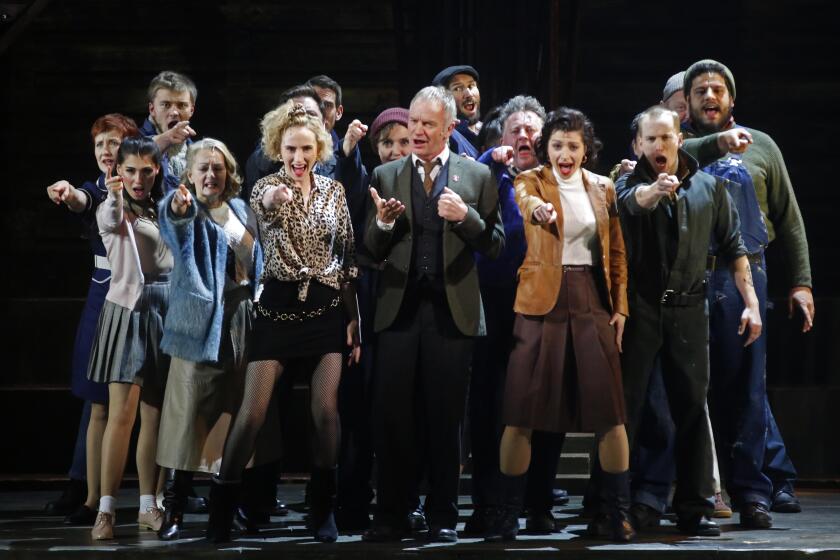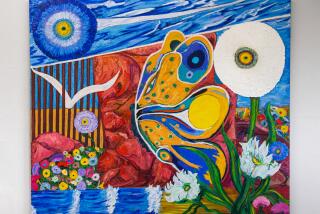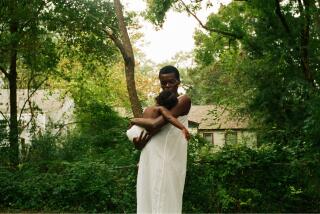Review: ‘17 Border Crossings’ proves an effective passport to a divided world
“17 Border Crossings,” a performance work by Thaddeus Phillips that touched down at the Broad Stage in Santa Monica for two performances this weekend, sounds topical and maybe a little earnest.
It’s not.
The production, directed by Tatiana Mallarino (Phillips’ wife), is more of an unusually themed travelogue flecked with politics. Phillips, who begins with the famous St. Crispin’s Day speech from Shakespeare’s “Henry V,” takes his audience on a voyage around the world. But his goal isn’t to visit crowded tourist attractions or sample exotic cuisine.
Instead, he spends the bulk of his time exploring those heavily patrolled spaces between countries — the border checks that, for all their bureaucratic drabness, have a way of reflecting national temperaments.
Imagine wandering the globe and only reporting about the tense experiences of passing through customs. It’s a credit to Phillips’ resourcefulness as a storyteller that he captures so many telling details about place and period while creeping through international limbos.
In the soloist tradition of Spalding Gray and Mike Daisey, Phillips takes occasional refuge behind a desk. But his wanderlust cannot be contained. A physical performer who comes across as an urban Everyman, he turns “17 Border Crossings,” which he created and scenically designed, into a visual album of anecdotes.
His recollections of his passage between Hungary and Serbia, Israel and Jordan, and Syria and Greece are illustrated not pictorially but theatrically. A rack of lighting and speakers is ingeniously deployed to create distinctive spaces that conjure the internal logistics of being a stranger in an ambiguously welcoming land.
David Todaro’s lighting design goes from fluorescent to feverish color as the geography of Phillips’ experience shifts. Equally versatile is Robert Kaplowitz’s sound design, which is especially effective at simulating those tones of indecipherability as foreign tongues blare out of public address systems. (Phillips’ linguistic mimicry conveys the distinctive culture sensibilities demanding his passport.)
Rock legend Sting stars in a retooled version of his Broadway musical, ``The Last Ship.’ The attempt is worthy but the musical still takes on water.
The structure of the piece has a free-form individuality. There’s nothing hectoring about “17 Border Crossings.” The political nature of the work is more implicit than explicit. In recollecting his journeys, Phillips sets out to humanize the vulnerable explorer precariously poised between governments.
He relates the tragic story of Jose Matada, a gardener from Mozambique who was a stowaway on a plane from Angola that was headed to London. But travel isn’t an act of desperation for Phillips. He goes to Croatia while conflict is erupting in the region to meet a woman who doesn’t show up. He is denied entry into Bali from Singapore because the person accompanying him has a passport from a newly formed country that isn’t yet included on the official list.
Human beings are hardwired to move and states are set up to regulate and restrict their movement. The conflict, though painfully in the news of late, is fundamental to human society. At a point when the discussion around immigration has become rancorously polarized, Phillips shifts the focus to the plight of the traveler in an attempt to lay down a mental bridge to the refugee.
The case might have been more powerfully made if the 17 crossings were threaded into a more cohesive narrative. The arrangement at times feels as desultory as a scrapbook.
Nearly two decades after profound loss led to her play, Ruhl and composer Matthew Aucoin morph “Eurydice” into an L.A. Opera and Met co-production.
Phillips limits what he reveals about himself. We hear about his wife and son on summer vacation in Spain and an out-of-body experience on herbal psychedelics in the Amazon. But he doesn’t tell us much about the itinerant protagonist the script designates as the Passenger. Allegorical power is harnessed, yet the loose organization invites a different kind of autobiographical indulgence. Memories are summoned, but the effect is to expand the collage without deepening it.
The writing is too scattershot to tie the disparate pieces together. But there are moments when the political expectations raised by the title are poetically met.
A scene from Mostar, a once harmonious city in Bosnia and Herzegovina, documents the “wall of sound” erected through a standoff between the Muslim call to prayer and Catholic church bells. Most haunting of all is the figure Phillips asks us to imagine at the show’s conclusion: a deported Mexican immigrant named Pablo who risks his life to reunite with his family in America.
Phillips doesn’t have much in common with this man. But as a fellow traveler in every sense, he identifies with his story.
More to Read
The biggest entertainment stories
Get our big stories about Hollywood, film, television, music, arts, culture and more right in your inbox as soon as they publish.
You may occasionally receive promotional content from the Los Angeles Times.













